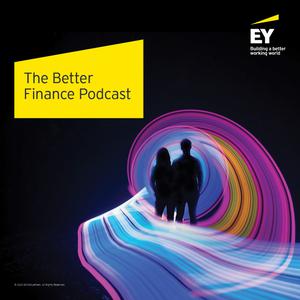
The Better Finance Podcast
EY
- 37 minutes 48 secondsHow Microsoft's approach to AI could shape the future of finance
In this episode of The EY Better Finance podcast, Cory Hrncirik discusses how artificial intelligence (AI) is changing finance at Microsoft.
Join host Myles Corson as he welcomes Cory Hrncirik, Modern Finance Lead at Microsoft, to discuss the transformation of Microsoft's finance function through the strategic application of artificial intelligence (AI). This episode of The EY Better Finance podcast delves into how AI is modernizing finance processes, enhancing forecasting accuracy and streamlining risk management.
The conversation highlights Microsoft's journey toward innovation within its finance department, marked by the rapid adoption of Microsoft Copilot. Cory Hrncirik outlines the critical role of high-quality, structured and pre-indexed data as the cornerstone for successful AI implementation and the continuous evolution of data management practices at Microsoft.
Moreover, the episode sheds light on the importance of a collaborative culture and systems thinking in achieving corporate objectives. It details Microsoft's strategic efforts to empower finance professionals as citizen developers, enabling them to leverage low code, no code tools, or partner with IT and engineering to catalyze the finance function's transformation.
Insightful and forward-looking, this episode provides a glimpse into how Microsoft's strategic approach to integrating finance and technology is securing its position in the rapidly evolving digital landscape.
© 2024 Ernst & Young Global Limited
3 December 2024, 2:13 pm - 28 minutes 5 secondsHow robotics and AI can transform finance in academia
In this episode of The EY Better Finance Podcast, Wayne Andrews, CFO at The University of Sydney, discusses how integrating GenAI and robotics can drive transformation and enhance finance's value.
Wayne Andrews, the Chief Financial Officer at The University of Sydney, shares his journey with host Myles Corson of revolutionizing the university's finance function. He navigates through the challenges of modernizing outdated systems and transforming the finance function from a purely transactional role into a key strategic partner.
Wayne highlights the pivotal role of embracing innovative technologies, spotlighting the establishment of a robotics and generative AI (GenAI) center of excellence. This initiative has significantly improved service delivery and achieved remarkable cost savings. By cultivating a culture of innovation and openness to unconventional solutions, Wayne and his team have not only boosted operational efficiency but also fundamentally changed how the finance function is perceived within the academic community. This transformation has been important in elevating the finance function's strategic impact on the university's overall success.
© 2024 Ernst & Young Global Limited
7 November 2024, 1:46 pm - 40 minutes 29 secondsHow CFOs are mastering change in the face of new challenges
In The EY Better Finance podcast, Myles Corson hosts Jenna Fisher and Jim Lawson, co-leaders of the Global Financial Officers practice at Russell Reynolds Associates. The duo share their extensive backgrounds in finance and recruitment, setting the stage for a deep dive into the transformative role of the modern CFO.
The conversation highlights the expanded scope of CFO responsibilities, from traditional fiduciary duties to strategic capital allocation and growth facilitation. Jim notes the shift towards strategy due to changing economic conditions, while Jenna points out the CFO's growing role in potentially succeeding to CEO positions, given the decline of the COO role.
They also examine the importance of developing finance talent in light of automation and specialization within finance functions. The role of technology, particularly AI, was discussed as a tool for optimizing operations and preparing for future leadership roles.
They emphasize the significance of diversity, equity, and inclusion in building effective finance teams and the positive impact of diverse perspectives on performance. Looking forward, they speculated on the future of the CFO role, suggesting that talent may increasingly come from private equity and investment banking sectors.
© 2024 Ernst & Young Global Limited
22 October 2024, 2:01 pm - 23 minutes 19 secondsHow serial acquirers can drive value and confidence
Myles Corson hosts Hai Tran, Senior Vice President of MasterCard, and Lukas Hoebarth, Partner at EY, to discuss the intricacies of mergers and acquisitions (M&A) in the face of economic uncertainty. The conversation centers on the important requirement for executive alignment and the strategic deployment of innovative technologies to navigate the complexities of executing mergers and acquisitions (M&A) transactions.
Hai Tran emphasizes the importance of establishing clear integration priorities and the consequences of misalignment, which can lead to lost value. Lukas Hoebarth provides insights into the recent trends in private debt funding and the rise in M&A activity, suggesting a cautious yet opportunistic approach to investment given the macroeconomic volatility.
The episode also touches on the transformative potential of artificial intelligence (AI) across various sectors, the evolving roles within corporate development functions, and the significance of ESG considerations in today's regulatory environment. The guests conclude by discussing the key performance indicators (KPIs) for M&A success and the necessity of a robust talent pool and strategic acumen in the field.
16 September 2024, 4:57 pm - 31 minutes 44 secondsHow board members can manage risk and complexity to drive success
This episode of The Better Finance podcast explores the board member’s role in risk management and company structure, and the impact of AI and technology on organizational challenges.
Host Myles Corson speaks with Jan Babiak, an independent board member and audit committee chair with extensive experience across various sectors and countries. The discussion begins with Babiak's recognition as one of the top 20 value-adding directors in the US. Her career journey is then explored, from her early days at the EY organization to becoming a seasoned board member. Jan has experience in areas, such as IT security, cybersecurity, regulatory and public policy, and climate change and sustainability.
Jan emphasizes the importance of boards managing not just routine business risk strategies, but also being prepared for unexpected events and future challenges. She highlights the differences in risk management responsibilities and resources between public and private companies, noting that private companies may not have the same infrastructure and may need to be more agile in their approach.
The conversation also touches on the influence of organizational structures on risk management, the impact of founder culture on private companies, and the challenges of balancing growth opportunities with risk mitigation. Jan shares her insights on the evolving risks associated with technology, particularly artificial intelligence (AI), and the need for businesses to be aware of the potential misuse of such technologies.
Myles and Jan discuss the similarities and differences in board membership across various countries, with Jan noting that while the day-to-day work is largely similar, governance models and regulations can differ significantly. She also offers advice to aspiring board members, stressing the need for intentionality, breadth of experience and openness to serving on different types of boards.
© 2024 Ernst & Young Global Limited
14 August 2024, 11:48 am - 34 minutes 25 secondsHow CFOs can harness the transformative power of AI in finance
In this episode, we delve into the transformative role of the CFO in the rapidly evolving landscape of finance, shaped by the advent of digital technology and artificial intelligence (AI). Glenn Hopper shares his insights on how the traditional responsibilities of CFOs are expanding beyond mere financial reporting to encompass strategic guidance and predictive analytics.
The episode provides an understanding of how CFOs can become pivotal change agents within their organizations. It discusses the importance of embracing technology and AI to not only enhance forecasting and metrics reporting, but also to drive informed decision-making processes. The episode also explores the value of leveraging data from a variety of sources, beyond financial data, to gain a competitive edge.
The episode also explores the reasons for CFOs to conduct thorough reviews of business processes across all departments and explains how identifying inefficiencies and optimizing data flows can help to improve an organization's overall performance. Plus, it offers some insights into the potential opportunities and limitations of AI in financial planning and analysis (FP&A).
Finally, the episode addresses the strategic leadership skills required by CFOs in this age of digital transformation. Glenn shares insights on the need for CFOs to understand data science principles and responsibly leverage AI tools to enhance organizational efficiency.
© 2024 Ernst & Young Global Limited
19 June 2024, 3:10 pm - 39 minutes 50 secondsWhy the EU Taxonomy could be a game-changer for green investments
Brian Tomlinson, EY Managing Director, ESG, Financial Accounting Advisory Services welcomes Evan Tylenda, Head of EMEA GS Sustain at Goldman Sachs and Nadia Humphreys, Head of Sustainable Finance Data Solutions at Bloomberg for an in-depth discussion on the EU Sustainable Taxonomy. The trio delves into how the taxonomy aims to standardize what constitutes “green” economic activities, its role in combating greenwashing, and how it influences a company's transition to sustainable practices.
They share insights from the first two years of reporting under the taxonomy, highlighting its increasing adoption beyond the mandated European companies and its potential to become a market standard for defining “green” funds. With the incoming expansion of the taxonomy to include four other environmental objectives, they discuss the implications for different sectors and the anticipated shift in the sustainable finance landscape.
Finally, they offer advice on leveraging the taxonomy to create a sustainability baseline, embracing voluntary reporting and maintaining transparency, which benefits companies and investors committed to understanding their green footprint and navigating the sustainable finance landscape.
The views and opinions expressed are those of the individuals and do not reflect the official policy or position of EY or any other organization.
© 2024 Ernst & Young Global Limited
15 May 2024, 3:30 pm - 23 minutes 6 secondsHow customer connections, reporting and sustainability drive success
In this episode, Lululemon executives Meghan Frank, CFO, and Alex Grieve, CAO, engage in a captivating conversation with Myles Corson. Together, they delve into their pivotal roles in driving Lululemon's success, highlighting the significance of sustainability, customer connections, and technological advancements.
To kickstart the discussion, Meghan and Alex reflect on their unique experience of sharing the CFO role for a brief period, which ultimately resulted in the development of a strong and mutually beneficial relationship between them. They emphasize how open and transparent communication has played a pivotal role in their successful engagement with investors. By consistently focusing on key themes that investors are genuinely interested in, they have been able to shape their communication strategies accordingly.
Recognizing the paramount importance of sustainability, Meghan and Alex proudly view it as an integral part of Lululemon's mission. They prioritize keeping investors well-informed about the company's progress in this domain, and specifically stress the crucial role of accurate reporting, including sustainability reporting.
Customer loyalty is another important aspect that Meghan and Alex address during their discussion. They delve into the various programs implemented by Lululemon to nurture and maintain customer satisfaction. Moreover, they emphasize that the very essence of Lululemon's DNA lies in fostering connection and building a strong sense of community among its customers. By prioritizing these foundational principles, Lululemon continues to cultivate and strengthen its customer relationships, reinforcing loyalty and further solidifying its position in the market.
The views and opinions expressed are those of the individuals and do not reflect the official policy or position of EY or any other organization.
© 2024 Ernst & Young Global Limited
16 April 2024, 12:54 pm - 22 minutes 33 secondsHow CFOs navigate the challenges in Finance today
In this episode of The EY Better Finance podcast, we are joined by Deirdre Ryan, Global Finance Transformation Leader, and Andrea Gronenthal, Americas Strategic Tax Transformation Leader from the EY organization, to delve into key findings from the EY Global DNA of the CFO survey.
The episode also features insights from two seasoned global executives : Joseph J. Wolk (Joe), the Executive Vice President (EVP) and Chief Financial Officer (CFO) of Johnson & Johnson, and Nick Priday, the CFO of Dentsu Group Inc., who were interviewed as part of the research.
During the discussion, Deirdre and Andrea examine three paradoxes that CFOs confront on a daily basis: balancing short-term and long-term value, navigating the tightrope between safety and boldness, and transitioning from a traditional skill set to assuming a strategic leadership role.
Enjoy this engaging exploration of the challenges and complexities faced by today's CFOs, and the multifaceted role they play in shaping the future of finance.
The views and opinions expressed are those of the individuals and do not reflect the official policy or position of EY or any other organization.
© 2024 Ernst & Young Global Limited
21 March 2024, 9:49 am - 31 minutes 55 secondsWhat sets exceptional CFOs apart: unlocking the secrets of successIn this episode of The EY Better Finance podcast, Jack McCullough president of The CFO Leadership Council, joins host Myles Corson to explore what makes an elite CFO.
In this episode of The EY Better Finance podcast, Jack and Myles dive into the world of CFOs, exploring the unique qualities that make them successful. Jack highlights that it's not just skills, but also personality traits, that can make an exceptional CFO stand out. Jack shares valuable insights on how to develop these traits and build stronger cross functional relationships.
Jack emphasizes the importance of fostering a culture of transparency where everyone feels comfortable sharing ideas and learning from mistakes. He also explains that as a CFO, it can be crucial to help everyone understands the company's goals and values.
In this episode, Jack also stresses the significance of establishing a personal brand as a CFO. This brand reflects one's expertise, reputation, and values within the industry. He discusses the role of a CFO as a storyteller and provides examples on how to create narratives that resonate with specific audiences.The views and opinions expressed are those of the individuals and do not reflect the official policy or position of EY or any other organization.
© 2024 Ernst & Young Global Limited
29 February 2024, 2:53 pm - 34 minutes 13 secondsWhy CFO communication is important in driving organizational change
In this episode, host Myles Corson and Phil Shelley, Chairman of doc Stribute, delve into the significance of clear and consistent CFO communication across all business areas. They explore its role in attracting the right shareholders, stakeholders and employees, and highlight the actions taken by successful CFOs to foster effective communication.
The episode underscores the importance of cultivating the right organizational culture to effectively execute a company's mission and vision. Without effectively communicating these goals, CFOs and their organizations risk attracting the wrong investors and talent, especially in a market where prospective employees and shareholders prioritize understanding the culture they will be a part of.
The episode also discusses the role of technology in the business world and the need for organizations to strike a balance between maintaining alignment and adopting new technologies into daily employee tasks. They also discuss Mergers and Acquisitions, emphasizing that transparent communication, regarding the acquisition's objectives, can be crucial for smooth transactions of this nature.
The views and opinions expressed are those of the individuals and do not reflect the official policy or position of EY or any other organization.
© 2024 Ernst & Young Global Limited
29 January 2024, 2:27 pm - More Episodes? Get the App
Your feedback is valuable to us. Should you encounter any bugs, glitches, lack of functionality or other problems, please email us on [email protected] or join Moon.FM Telegram Group where you can talk directly to the dev team who are happy to answer any queries.
 PwC's accounting podcast
PwC's accounting podcast
 FT News Briefing
FT News Briefing
 WSJ What’s News
WSJ What’s News
 Money Talks from The Economist
Money Talks from The Economist
 WSJ Tech News Briefing
WSJ Tech News Briefing
 Goldman Sachs Exchanges
Goldman Sachs Exchanges